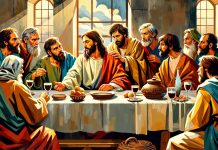In this second article in a series of three, we continue our analysis of three major anti-Sabbatarian arguments. The series will conclude with an assessment of Jesus’ practice and teaching on the Sabbath.
Argumentum e silentio: the Sabbath is absent in the patriarchal age
This is a classic argument, albeit inconsistent and invalid, inferred from silence (argumentum e silentio), a real scarecrow to intimidate literalists. In reality, frequent historical repetition of a commandment or custom is not necessary to prove its current binding force.
After being mentioned by Moses, the Sabbath does not appear in the biblical canon until the time of Elisha,[1] some seven centuries later. However, no one would suggest that the Sabbath was not kept all this time. It is mentioned in Elisha’s time not as a novelty but as an established custom. For the years 400 to 5 BC, the biblical canon does not contain any books covering this period of Jewish history. Nevertheless, could we say that the continuity of the Jews and their institutions in this period is not certain because the Bible is silent about it?
The Sabbath as a divine command in Exodus[2] and then as a reference in the Sinaitic Covenant[3] does not appear as an innovation. This fact is of paramount importance. In the manna episode, the week and its Sabbath appear as a known fact. Direct reference is made to the sixth day as a day of preparation, then it is said, “Tomorrow is to be a day of sabbath rest, a holy sabbath to the Lord” and after some evidence of disobedience, God says, “How long will you refuse to keep my commands and my instructions?”[4] Clearly, this reference to the Sabbath already implies an established ancient weekly tradition.
In Exodus 20:8-11, the people of Israel are referred to the Creation episode, thus explaining the purpose of the blessing and sanctification of the seventh day in Genesis 2:1-3. This relationship legitimately and sufficiently anchors the Sinaitic Sabbath commandment in the episode of the completion of Creation, even if there had been no Sabbatical cycle between the time of Adam and that of Moses. But the fact that the commandment does not establish a weekly reckoning and does not specify the date from which the reckoning is to begin shows that it refers to the weekly (Sabbatical) cycle that existed and was known before the manna story. If the weekly cycle continued between Adam and Moses, this means that the Sabbath continued and that there were followers of the Creator God who observed it.
And, indeed, the book of Genesis provides evidence of the continuity of the week. In the episode of Noah and the flood, there is frequent reference to the weekly cycle as “seven days,”[5] which has become a common popular expression.[6] The explicit word “week” appears for the first time in the account of Jacob’s marriage.[7]
In conclusion, not only must the patriarchs have been aware of the Sabbatical cycle, but if such a cycle was kept until Moses, it means that there were people who kept it: “For I have chosen him, so that he will direct his children and his household after him to keep the way of the Lord by doing what is right and just, so that the Lord will bring about for Abraham what he has promised him”[8] or, “because Abraham obeyed me and did everything I required of him, keeping my commands, my decrees and my instructions.”[9]
Read the previous article of this series:
Michael Morrison tries to counter this with Jewish sources, claiming that the Talmud says that Abraham did not keep the Sabbath. Even if the Talmud were to make this statement, there is no reason to take seriously a Talmudic statement in the field of archaic history that was made thousands of years after Abraham. However, the reality is that the Talmud (Pesikta Rabbati)[10] does not say that Abraham ignored the Sabbath, only it is not explicitly stated that he observed it. Furthermore, the same source states that Jacob rigorously observed the Sabbath.[11] Morrison’s argument is therefore profoundly misguided.
Genesis 2:1-3 explains to the Jews and to mankind, in general, the origin of the week and the Sabbath, and Exodus 16 and 20 show that the Sabbatical cycle was a known traditional fact. Between these instances, the seven-day cycle (the week) is mentioned several times, enough for us to know that there was a genealogical line that preserved the weekly/Sabbath cycle.
The Sabbath is for Jews only
This cliché, held by Morrison and most anti-Sabbatarians, that the Sabbath is exclusively Jewish, can be found in some patristic writings (Justin Martyr, John Chrysostom), though it is not a Christian invention, but one of the claims of post-biblical, decadent Judaism, beginning in the Greco-Roman period.[12] The Jews came up with the idea that while the six working days each had a pair, the Sabbath remained without a pair until Israel came alongside it. Commenting on the legal statement that the Sabbath was made as “a sign between Me and you [Israel],”[13] the Mekhilta (Massekta de-Shabbeta 1) adds, “and not between Me and the peoples of the world.”
The Exodus Rabbah commentary (25:11) even implies a condemnation of non-Jews who try to keep the Sabbath. Rabbi Levi,[14] driven by a terrible nationalistic-mystical zeal, claimed that God gave Noah’s descendants only seven laws, not including the Sabbath, and that therefore a Sabbath-keeping Gentile (indicating that there were such believers in his day!) deserved capital punishment. The Gentiles who kept the Sabbath without becoming Jews seemed more detestable to them than those with no connection to Judaism. This envious attitude is a sign of a profound theological and spiritual degeneracy from which earnest Christians should not draw inspiration.
However, not all Jewish scholars agreed that the Sabbath was for Jews only. Ancient Jewish writings affirm the universality of the Sabbath. For example, the Alexandrian Jewish philosopher Philo[15] stated that the Sabbath is “the festival, not of a single city or country, but of the universe, and it alone deserves to be called ‘public’ as belonging to all people and the birthday of the world.” And the Jewish historian Josephus, showing goodwill and admiration for the export of the Sabbath, wrote to the Greco-Roman world, which knew the situation: “The masses have long since shown a keen desire to adopt our religious observances; and there is not one city, Greek or barbarian, nor a single nation, to which our custom of abstaining from work on the seventh day has not spread.”[16]
The universality and the non-ethnic character of the Sabbath first emerge from the Creation narrative,[17] in spite of the distortions of this text on which some insist, as we have shown above.
Likewise, the fact that the Sabbath was given to the Jews at Sinai is explained by the need for Israel to preserve and spread the Truth of God by example in a Noahide world fallen from monotheism and disoriented.
The prophets make it clear that God’s plan was for the whole world to know God’s law, including the Sabbath, through Israel.[18] Psalm 92, the only psalm explicitly written for the Sabbath, does not make an exclusive connection between the Sabbath and Israel; on the contrary, it points to God’s universal creation and says that only the “fool” (‘īš báᶜar, lit. “foolish man”) and the “conceited” (kǝsīl) do not understand this simple relationship.
A few decades after the resurrection of Jesus, Luke, a Gentile evangelist and associate of Paul, the apostle of the pagans, makes it clear in the Gospel[19] and the Acts of the Apostles[20] that the Christian mission had popularised the Sabbath among the Gentiles as well. Therefore, the apostles did not believe, like the exclusivist rabbis, that the Sabbath was only for Jews.
The Sabbath, the Ten Commandments and the New Covenant
Morrison’s claim (which reflects a common evangelical prejudice) is that the Sabbath, together with the other commandments that make up the Decalogue (the Ten Commandments), constitutes the covenant of Sinai, the strictly Jewish covenant, the “old” covenant, and therefore has nothing to do with Christianity, which is a new covenant.
The contrast between the two covenants (old and new)—what is called the federal theology (of the covenants), which is often carried to the point of opposition and contradiction between the two covenants—is based on Paul’s polemic with the ultra-conservative Judaeo-Christians and Judaizers[21] in which the apostle of the pagans resorts to simplifications and exaggerations in order to illustrate the superiority of the Gospel. However, before understanding Paul properly, Christians should be specialists in Moses and the prophets and the teachings of Jesus. Beginning Christian literacy with Paul’s most profound and difficult statements is not a very wise idea.
Peter warns: “…just as our dear brother Paul also wrote you with the wisdom that God gave him. He writes the same way in all his letters, speaking in them of these matters. His letters contain some things that are hard to understand, which ignorant and unstable people distort, as they do the other Scriptures, to their own destruction. Therefore, dear friends, since you have been forewarned, (cf. 2 Peter 2:1-2; 3:1-2, etc.), be on your guard so that you may not be carried away by the error of the lawless and fall from your secure position. But grow in the grace and knowledge of our Lord and Savior Jesus Christ.”[22]
With this warning in mind, it is worth asking and answering some legitimate questions:
- What was Paul’s view of the Decalogue (the Ten Commandments)?
Paul refers to the Decalogue in the affirmative, but does not feel the need to repeat it in full. He cites only a few commandments for illustration[23] or refers to them in a general way, contrasting “the letter” with “the Spirit” which removes the veil of legalism.[24] For Paul, “being a new creature” means “keeping God’s commands,” as opposed to circumcision.[25]
With respect to the Sabbath, Paul did not give a “new” commandment, nor did he abolish the “old” one, but he affirmed the Sabbath by example and invitation,[26] just as Christ, his Lord, affirmed it at Creation[27] and in His incarnate life.[28] Moreover, the Apostle saw in the observance of the Sabbath (sabbatismós) an experience and metaphor of the restfulness of faith and obedience (Hebrews 3:19; 1-11). When Paul visited the places where he preached the gospel, he often stayed “seven days” so that he would have at least one Sabbath to meet with everyone, and thus the weekly cycle obviously took on meaning for him and his co-workers (Acts 20:6; 21:3-5; 13-14; see also 27:23; 28:13-14).
Paul considered the breaking of the commandments as a transgression and showed that the role of the Law is precisely to condemn those who break these principles. Paul does not abolish any of the commandments, and he insists that it must not be forgotten that “the goal of this command is love,”[29] that it must be applied “properly,”[30]—meaning in a way “that conforms to the Gospel”[31] and not in the Pharisaic, Talmudic, nitpicking, superstitious, and meritocratic spirit that was the hallmark of decadent Judaism in the Greco-Roman period.
- How do we explain the silence of Paul’s opponents regarding the Sabbath?
Paul was accused by both Jews and Judaising Christians of abolishing the Torah (Law), but when it came to naming the specific precepts he abolished, the Sabbath is never mentioned.
In contrast, Jesus was often accused of desecrating the Sabbath (by the healings He performed, or by allowing His disciples to eat wheat as they walked through the fields). For this reason, some Jews were so angry that they would have gladly killed Him for supposedly “breaking the Sabbath” and believing Himself to be equal to God.[32] In the Sanhedrin court and in Pilate’s Praetorium, however, the charge of Sabbath desecration, which would have been sufficient to condemn a rebel to death, was not mentioned at all. Not even the lying witnesses of the Jews made such an accusation of Sabbath desecration as some Christians now claim.[33]
- How do you explain Paul’s apparent contradictions regarding the involvement of Law, commandments, and works?
Paul is often cited as the founder of the theology of grace and faith, which would nullify the “works of the law,” the observance of the commandments, and the binding nature of the “letter.” Yet the apostle who denigrates the “works of the Law” as powerless and as a sign of remaining under the curse[34] uses exactly the same expression (érgon nómou, “the works of the Law”) in a positive sense, as a principle that even pagans have inscribed in their conscience.[35] Paul reiterates that no one can be declared righteous before God by the Law, and that seeking such justification only leads to separation from Christ and grace.[36] However, the same Paul affirms that “it is not those who hear the law who are righteous in God’s sight, but it is those who obey the law who will be declared righteous.”[37] There are many more examples, but the basic principle is that these statements must be understood in context, in the harmony and complementarity of opposites, so as not to dogmatise a false gospel.
- Is Paul’s teaching on the covenants complete and systematic? How does this teaching harmonise with that of earlier writers?
Nowhere does Paul claim to be writing a federal (of the covenants) theology. He merely uses a contrast between the Sinaitic covenant, which had degenerated into a legalistic Jewish theology of human merit, and the new (messianic, Christocentric) covenant, which is seen as an internalisation of divine values and principles. When we turn to Scripture, however, we find other covenants between God and human beings, many of which are interrelated: the Noahic covenants (with Noah), which include all his descendants,[38] or the Abrahamic covenants, which include Isaac and Jacob[39] and all their descendants, including spiritual descendants through Christ.[40]
God freed Israel from Egypt and other tribulations as a result of the covenant made with Abraham.[41] The covenant of Sinai seems to be nothing more than the actualisation of this covenant in the generation of the Exodus. Moreover, it is not a new covenant, but “My covenant”, thus implying both the special role of Israel in this covenant, as opposed to all other peoples, and the motivation that “the whole earth is Mine.”[42] On several occasions, God made a covenant with Israel, which can only mean the recall or renewal of the original or previous covenant.[43] The Sabbath, which appears at Creation as a universal blessing, was not only entrusted to Israel as an inheritance, but also became a sign of the covenant between God and His people.[44]
The Sinai Covenant was broken by Israel, a fact illustrated by the breaking of the first stone tablets of the Decalogue.[45] Nevertheless, other tablets containing the same Ten Commandments were made and placed in the Ark.[46] The covenant was also broken in later generations,[47] but God did not replace it with a more negotiable one.
Contrary to popular opinion, the covenant with Israel was based on God’s grace, on faith expressed (and demonstrated) in loving obedience, not on human merit.[48] God’s plan was to extend the covenant to other peoples, especially the original Sabbath law—but also the Mosaic ceremonies.[49] There is no demonisation of God’s covenant with Israel in Scripture.
The renewal of the covenant with Israel after the Babylonian exile is called an everlasting covenant.[50] God decided the return and restoration of the Jews on the basis of a new covenant, which was also conditional, but better than the covenant of Sinai. It was foreseen that Jerusalem, rebuilt after the exile, would never be destroyed again[51] and that the apostate Jews and Gentiles would also benefit from this covenant.[52] We are talking about the Messianic Covenant, first promised to Israel, but then proclaimed to the whole world.[53] The Messiah was to be the mediator and herald of this covenant.[54]
Since the Babylonian exile, the term “covenant” was used as a synonym for “religion.”[55] Jesus understood that His mission sealed a New Covenant with Israel and all peoples.[56]
- What is the main difference between the Old and the New Covenant?
Paul mentions certain differences, such as the fact that the New Covenant is of the Spirit, which gives life, and not of the letter, which brings death.[57] Does this mean that the Old Covenant was of the letter and not of the Spirit? Or that the New Covenant is “spiritual” and has nothing to do with the letter? Are the Ten Commandments only to be understood “spiritually” in relation to the New Covenant? Paul illustrates the two covenants through the two wives of Abraham:[58] among his sons, Ishmael represents Abraham’s legalistic descendants (traditional Jews), and Isaac represents Abraham’s spiritual descendants (Jews or Gentiles who have received Christ), the sons of faith, born of promise.
But did God intend such a literal and legalistic covenant, which was useless because it led to slavery and death? This is a question to which evangelicals have no reasonable answer. On the other hand, the Law itself shows that the Old Covenant was designed to bring closer the blessings that we consider to be specific to the New Covenant. God never required a legalistic, formalistic, or outward service. Paul contrasts the two covenants, taking into account the mindset of decadent Judaism and the blind, legalistic-literalistic way of understanding and practising the Jewish religion. Yet the spiritual requirements were the same in the covenant of Sinai. God demanded that the Law be internalised and that the motivation be love, not anything else.[59] God promised to “circumcise” the heart and bring repentance,[60] just as He promises in the New Covenant.[61] And to “the righteousness that is by faith,”[62] Paul applies precisely those statements of Moses concerning the words of the covenant.[63]
Such considerations suggest the need for further study in this area, no longer relying exclusively on a few Pauline statements, but leading to the development of a realistic, balanced, and harmonious federal theology in accordance with the whole of Scripture. However great Paul may have been, a theology that merely invokes and exalts him cannot become the supreme criterion or standard of orthodoxy over Moses, David, Isaiah, Jesus, Peter, James, John, and so on.
- How do the Ten Commandments relate to the Old Covenant and the New Covenant?
It is important to note that between the Old Covenant and the New Covenant, as stated in Jeremiah 31 and Hebrews 8, it is not the identity of the commandments that changes, but people’s attitude to them. Religious changes, if they occur from age to age, are not substantial. In the first covenant, the commandments were written on stone tablets and had an outward binding authority in the Jewish theocratic state[64] although God had promised His spiritual help so that the laws would be written on the hearts of the people,[65] just as in the New Covenant. What is the promise of the New Covenant? That God will write His Law on the hearts of believers and place it in the ark of their souls.[66] He does not speak of a “different law” or of a law that has been summarised or adapted, but of “My law”, the same Law.
As proof of the presence of the Decalogue at the heart of the New Covenant, as it was at the heart of the Old Covenant, the vision given by Jesus to his beloved disciple some seventy years after His resurrection—in which He foretold, among other things, the criteria of divine judgement—recalls the magnificent scene when “God’s temple in heaven was opened, and within His temple was seen the ark of his covenant.”[67] John does not say whether it was the ark of the Old or the New Covenant. He only indicates that he saw the heavenly temple, the true temple; and when he saw the ark, the terrible phenomena of Sinai were triggered, which will be repeated in the catastrophic form of the seven plagues.[68] After such a manifestation, it is useless to ask what is the difference between the letter of the Old Covenant and that of the New Covenant.
In Hebrews 12:18-26, a contrast is drawn between the two covenants, one from Sinai, the other from the heavenly Jerusalem. Both are about obedience. It is not a matter of different commandments, but of far greater privileges and responsibilities under the New Covenant. What is called “obsolete” in Hebrews 8:13 has nothing to do with the binding nature of the Ten Commandments. As long as the world and the need to believe in a Creator God exist, there can be no reason for the commandment that invokes Creation to become “obsolete.”
Morrison’s principle (that even if Genesis 1:1-3 were a universal Sabbath commandment, he feels more bound by the epistles) is an extremely serious evangelistic prejudice. It would mean that the authority of the New Testament is superior to that of the “Old.” Moreover, even if we stay within the New Testament, when Morrison referred to the epistles, he only quoted from Paul’s epistles. There seems to be an unwritten evangelical law which elevates Paul above the other New Testament authors, first as an exceptional theologian and preacher of universal Christianity, and then even as a kind of criterion for determining the orthodoxy of the other authors. Thus, for some, Paul’s writings became a kind of canon within a canon.
The two “covenants” must not be confused with the two “testaments” of the Bible, although there is a close connection between them. If the Old Covenant with Israel can be called “obsolete” in its specific aspects,[69] the “first testament” of the Bible is never “obsolete.” Paul’s letters outline the essential principles of the Christian gospel, but they do not place apostolic authority above the authority of Moses and the prophets. Jesus and His sacrifice make the difference between the two ages. All the commandments given “until the time of the new order”[70] were annulled by His death and resurrection, but the commandments of a universal nature (concerning morality, life, and spirituality) still stand, as does the relationship between sacred history and Messianic prophecy.
Florin Lăiu is a former Bible professor at the Theological Seminary of the Adventus University in Romania where he worked for 28 years, specialising in biblical languages, biblical exegesis, apocalyptic and biblical translation. Now retired, he is an Adventist apologetic, poetry and music enthusiast, author of articles and books, husband, father of four, and grandfather of six.




















